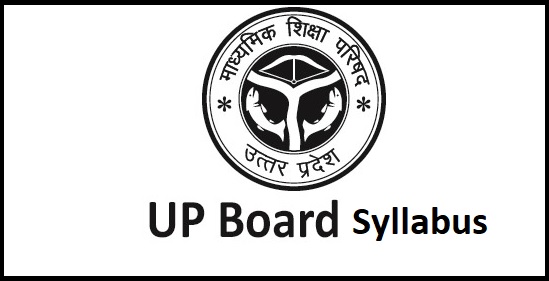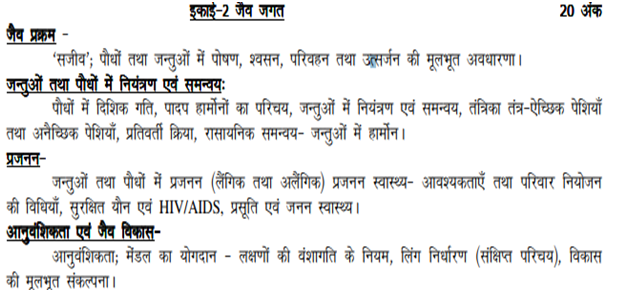UP Board Class 10 Science Syllabus (विज्ञान पाठ्यक्रम) 2024-25

Science is considered as one of the important subjects for the students at class 10th level especially if they wish to choose this as their stream in senior secondary classes. To prepare well for this subject, it is important that the students familiarize themselves with the syllabus first. The board has designed the UP Board Class 10 Science Syllabus 2024-25 in a manner that it covers all the important topics organized into appropriate categories for the students to understand well.
10वीं कक्षा के छात्र इस लेख में विज्ञान पाठ्यक्रम के विवरण देख सकते हैं। यह लेख पाठ्यक्रम से संबंधित संपूर्ण जानकारी प्रदान करता है जिसमें महत्वपूर्ण विषय, अंक वितरण आदि शामिल हैं।
Syllabus for UP Board Class 10 Science Subject
The unit-wise important topics included in the Science subject for class 10th level has been provided below. Candidates should study all these topics very carefully while preparing for the board exams.
सभी विषयों को पांच अलग-अलग इकाइयों में वर्गीकृत किया गया है। छात्र नीचे दी गई तालिका से विभिन्न इकाइयों और उनके लिए अंक वितरण की जांच कर सकते हैं।
| Unit No. | Unit Name | Total Marks |
| Unit I | रासायनिक पदार्थ प्रकृति एवं व्यवहार
Chemical Substances- Nature & Behavior | 20 |
| Unit II | जैव जगत
Bio World | 20 |
| Unit III | प्राकृतिक घटनाये
Natural Phenomena | 12 |
| Unit IV | विद्युत् का प्रभाव
Effect of Electricity | 13 |
| Unit V | प्राकृतिक संसाधन
Natural Resources | 5 |
| ——- | Total | 70 |
| ——- | प्रयोगात्मक कार्य एवं प्रोजेक्ट | 30 |
| ——- | Sum Total | 100 |
UP Board 10th Science Important Topics
Unit I: Chemical Substances- Nature & Behavior
- Chemical Reactions: Chemical Equation, Balanced Chemical Equation, Meaning of Balanced Equation, Types of Balanced Chemical Reactions- Combination Reaction, Decomposition Reaction, Displacement Reaction, Double Displacement Reaction, Precipitation Reaction, Neutralization Reaction, Oxidation Reaction And Reduction Reaction
- Acid, Base And Salt: Definition of Acid, Base And Salt On The Basis of H+ And Oh– Ions, General Properties, Examples And Application, Concept of pH Scale, Importance of pH In Day-To-Day Life, Sodium Hydroxide, Baking Soda, Bleaching Powder, Sodium Carbonate, Manufacturing And Application of Plaster of Paris
- Metals And Non-Metals: Properties, Reactivity Series of Metals And Non-Metals, Formation And Properties of Ionic Compounds, Basic Methods of Metallurgy, Corrosion And Its Prevention
- Carbon And Its Compounds: Covalent Bonds In Carbon Compounds, All-Round Nature of Carbon, Homologous Series, Nomenclature of Carbon Compounds Having Functional Group, Difference Between Saturated And Unsaturated Hydrocarbon, Chemical Properties of Carbon Compounds, Ethanol And Ethanoic Acid, Soaps And Detergents
- Periodic Classification of Elements: Need For Classification, Elementary Classification, Modern Periodic Table, Up Gradation of Properties, Valency, Atomic Number, Metallic And Non-Metallic Properties

Unit II: Bio World
- Biological processes: Nutrition, Respiration, Transportation and Emissions in plants and animals
- Control And Coordination In Animals And Plants: Directional Motion In Plants, Introduction To Plant Hormones, Control And Coordination In Animals, Nervous System, Voluntary And Involuntary Muscles, Reflex Action, Chemical Coordination, Hormones In Animals
- Reproduction: Reproduction In Plants And Animals- Sexual And Asexual Reproduction, Reproductive Health- Needs And Family Planning, Safe Sex And HIV/AIDS, Maternity And Reproductive Health
- Heredity and Bio-Development: Heredity, Contribution Of Mendel, Laws Of Inheritance Of Traits, Gender Determination (Brief Introduction), Basic Concept Of Development

Unit III: Natural Phenomena
- Reflection: Reflection Of Light By Curved Surface, Image Formation By Spherical Mirror, Curvature Center, Main Axis, Main Focus, Focus Distance, Mirror Equation, Magnification
- Refraction: Laws of Refraction, Refractive Index, Refraction By Spherical Lens, Image Formation By Spherical Lens, Rules For Image Formation By Lenses, Lens Equation, Magnification, Power Of lens
- Human eye: Function Of Lens In Human Eye, Vision Defects & Prevention, Application of Spherical Mirrors And Lenses
- Light: Refraction of Light Through Prism, Deflection of Light, Scattering of Light, Application in Daily Life

Unit IV: Effect of Electricity
- Electric current: Electric Current, Potential Difference And Electric Current, Ohm’s Law, Resistance, Resistivity, Factors On Which The Resistance Of A Conductor Depends, Resistance Combination (Series & Parallel) And Their Application In Daily Life, Thermal Effect Of Electric Current And Its Application, Electric Power, Interconnection Between P, V, I, R
- Magnetic effects of electric current: Magnetic Field, Field Lines, Magnetic Field Due To Current Carrying Conductor, Magnetic Field Due To Flow Of Current In Solenoid, Force Of Electric Current In The Magnetic Field, Fleming’s Left Hand Rule, Electric Motor, Electromagnetic Induction, Induced Potential Difference, Induced Electric Current, Fleming’s Right Hand Rule, Electric Generator, Direct Current, Alternating Current, Alternating Current Frequency, Advantage Of Alternating Current Over Direct Current, Domestic Electric Circuit

Unit V: Natural Resources
- Source of energy: Different Forms Of Energy, Conventional And Non-Conventional Energy Resources, Fossil Fuels, Solar Energy, Biogas, Wind Energy, Water Energy, Tidal Energy, Nuclear Energy, Comparison Of Renewable And Non- Renewable Energy Resources
- Our environment: Ecosystem, Environmental Issues, Depletion Of Ozone Layer, Waste Production And Prevention, Biodegradable and Non-Biodegradable Substance
- Management of natural resources: Conservation of Natural Resources And Their Proper Use, Forest And Wildlife, Conservation Of Coal And Petroleum, Role Of People In Forest Management, Dams- Uses And Limitations, Water Conservation, Sustainable Natural Resources

Experimental work and project
Marking of the experimental work and project will be done on the school level and will carry a total of 15 marks each. Check the details of experimental work and project from below.




Internal Exam
- प्रथम आन्तरिक मूल्याकन परीक्षा- (प्रयोगात्मक तथा प्रोजक्ट कार्य) अगस्त माह – 10 Marks
- प्रथम आन्तरिक मूल्याकन परीक्षा- (प्रयोगात्मक तथा प्रोजक्ट कार्य) दिसम्बर माह – 10 Marks
- चार मासिक परीक्षाए – 10 Marks
- प्रथम मासिक परीक्षा (बहुविकल्पीय प्रश्नों (डब्फ) के आधार पर) मई माह
- द्वितीय मासिक परीक्षा (वर्णनात्मक प्रश्नों के आधार पर) जुलाई माह
- तृतीय मासिक परीक्षा (बहुविकल्पीय प्रश्नों (डब्फ) के आधार पर) नवम्बर माह
- चतुर्थ मासिक परीक्षा (वर्णनात्मक प्रश्नों के आधार पर) दिसम्बर माह
Other Subjects Syllabus: Check here


Can you send science syllabus of class 10 UP board in English
Math syallbus
Send me
How may we help you Ajeet?
Pleas mujhe 10 class up board me aani wali questions bataiya
Thanks thanks thanks
Thnx brother
Thank you!
Bhai up bord me Science English me likh sakate hai plzz bta do
Ha bilkul
Mam mujhe 10th ke slabass ka pdf chahiye
We have inserted the PDF in this post.
Kiss side se download kare mam ji
2023 ka all chapters bhata day bro plz
Up board exam all syllabus bataday bro plz
Haiiiiii🖕🏼🖕🏼🖕🏼🖕🏼🖕🏿🖕🏿🖕🏿
What do you mean?
Thanks all India and all India students
Thanks all India ka jo hamare liye itana sochate hai vese mera name shailesh hai
Tell me the science Reduced chapter 2021-22 please
Please test launch kar digya English ma class10th ka
Science me koun koun se sayllabus
Kate h?
Please refer the post and PDF.
Chapterwise nhi kata h topic wise kata h anjali
Please upload U.P board english medium reduced syallbus and sample papers please its a humble request.
Mere pass hai english syllabus 2023 and sample paper
Science reduced syllabus for up board class 10th 🙏🙏please 🙏
Please please
Yes
I am nikhil
Ji nikhil aap ki kya problem h
Nice
Helo bro
Mujha bhi bata than bahi